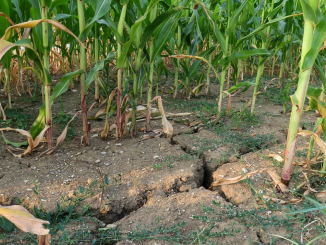Throughout 2020, ARC2020’s Matteo Metta, along with Hans Wetzels and Rosa Melina Armijo Campos have worked on the Common Agriculture Policy, CAP, specifically the unfolding of the CAP Strategic Plans process. This work has formed the content of our dedicated CAP Strategic Plans section, and the new report which has been compiled from these policy analysis pieces. Below we present the introduction to this new report, and have made available the report to download here, too.
Download full report as PDF
The Common Agricultural Policy – CAP – is one of the most significant and long-lasting policies of the European Union. In 2018, the European Commission made a CAP reform proposal which had, among other elements, a new delivery model and a green architecture that included new ecological initiatives. So how has this initial Commission CAP communication fared in the months since June 2018?
Since the Commission’s proposal, the CAP reform post 2020 has been a drawn-out process. It initiated with some political ambition, which was later backed up with the European Green Deal’s targets and objectives. However, it has subsequently lost its way, if it is to seriously tackle the socio-economic and environmental challenges Europe and the world face. The current state of the reform will likely have too little or no impact on many aspects of the CAP, unless the co-legislators work constructively with the Commission in trilogue on conditionalities, eco-schemes, fair distribution of payments, horizontal rules, common market organisation, accountability.
With the help of agri-food lobbies and business-as-usual supporting politicians, the reform process has slowly moved on at two levels: at EU level, both the European Parliament and the Council reached agreement on their respective positions in October 2020, which gives them the mandate to negotiate in the trilogues with the Commission and approve the full package of three regulations on the CAP post 2020.
At national level, the Member States have set the bases for their national CAP Strategic Plans (e.g. SWOT analyses, assessment of needs, preliminary design of interventions), but much still needs to be prepared before the submission, final approval by the Commission, and entrance into force, most likely to happen only by January 2023.
What has ARC2020 done? Aims and Objectives.
ARC2020 has worked with progressive NGOs, scientists, and civil society organisations to analyse the reform process at EU level, in a selected number of Member States, and beyond the EU.
This report compiles all policy analyses carried out and published in 2020 with the aim of:
■ Describing how the CAP Strategic Plans were being prepared and designed in a selected number of Member States.
■ Identifying good practices and limitations in the Member States, as well as in the positions of the European Parliament, Council, and European Commission.
■ Providing policy recommendations to the co-legislators, Member States, and NGOs.
As part of a progressive civil society movement, ARC2020’s project pursued these objectives by raising the following policy analysis questions:
1. Is there a transparent and inclusive approach throughout the design process of the CAP Strategic Plans (e.g. SWOT analyses, Strategic Environmental Assessment, ex-ante evaluation, definition of eco schemes)?
2. Are the CAP Strategic Plans and CAP reform post 2020 addressing the higher environmental and climate ambition required to deal with the climate emergency, biodiversity decline, and depletion of natural resources in global, regional and local agri food systems?
3. Are the CAP Strategic Plans and CAP reform post-2020 ensuring a better targeting of support, including a fairer distribution of direct payments among European farmers?
4. Are the Member States and the EU co-legislators ensuring a rural proofed CAP reform post 2020, which promotes sustainable territorial development in rural areas, links local CAP support to cohesion policy, and leverages larger scale investments and support from other EU and national policies?
5. What are the implications of the CAP Strategic Plans and CAP reform post 2020 beyond the EU, in relation to trade, rural cooperation, labour rights, environmental standards?
Along the way, ARC2020 has scrutinised policy documents and meetings, scientific publications and audit reports, and networked with progressive NGOs, critical scientists, policy advisors, and stakeholders on the ground.
This report concludes by identifying areas for future policy analysis and action in 2021. These include a critical screening of the decisions to be made in the CAP Strategic Plans on eco-schemes, capping, degressivity, indicators and data systems, decentralisation and division of responsibilities with regional and local authorities, inclusion of health and environmental stakeholders, environmental spending and delivery in Pillar II, and more.
What’s Next?
Attention needs to be paid to the last round of the trilogue negotiations, as well as to the approval process of the CAP Strategic Plans. Here the Commission has made numerous promises in relation to transparency, pledging the disclosure of public material, and, importantly, recommendations and criteria to approve or reject the submitted plans.
ARC2020 will continue to play a critical role of CAP watching in the EU institutions and Member States, and to work with civil society organisations, scientists, farmers and broad rural voices in order to keep attention on the reform and influence national strategic plans. CAP reform is an uphill battle.
While trying to reach an agreement at EU level, the Member States will be engaged with stakeholders and scientists to define the national delivery mechanisms, monitoring and evaluation frameworks, and details of the interventions to be supported in the CAP Strategic Plans. Despite the broader policy and market constraints, the opportunity to identify good practices and advocate for more sustainable food systems and vibrant rural areas is still there – Member States can still make the necessary changes to make the CAP fairer, greener, healthier, and rural-proofed.
With thanks to Heinrich-Böll-Stiftung European Union for support. Special thanks also goes to the people from the European and National coalitions who actively contributed to this project:
Por Otra PAC, Spain
Pour une Autre PAC, France
Cambiamo Agricoltura, Italy
Deutscher Naturschutzring, Germany
Arbeitsgemeinschaft bäuerliche Landwirtschaft e.V., Germany
BUND, Friends of the Earth, Germany
Koalicja Żywa Ziemia, Poland
The Environmental Pillar, Ireland
Good Food Good Farming, EU
EU Food Policy Coalition, EU
Download full report as PDF
 This article is produced in cooperation with the
This article is produced in cooperation with the
Heinrich Böll Stiftung European Union.
All Contributions to CAP Strategic Plans
CAP Performance Monitoring and Evaluation Framework – EP Position
A Rural Proofed CAP post 2020? – Analysis of the European Parliament’s Position
CAP Beyond the EU: The Case of Honduran Banana Supply Chains
CAP | Parliament’s Political Groups Make Moves as Committee System Breaks Down
CAP & the Global South: National Strategic Plans – a Step Backwards?
CAP Strategic Plans on Climate, Environment – Ever Decreasing Circles
European Green Deal | Revving Up For CAP Reform, Or More Hot Air?
Climate and environmentally ambitious CAP Strategic Plans: Based on what exactly?
How Transparent and Inclusive is the Design Process of the National CAP Strategic Plans?






2 Trackbacks / Pingbacks
Comments are closed.